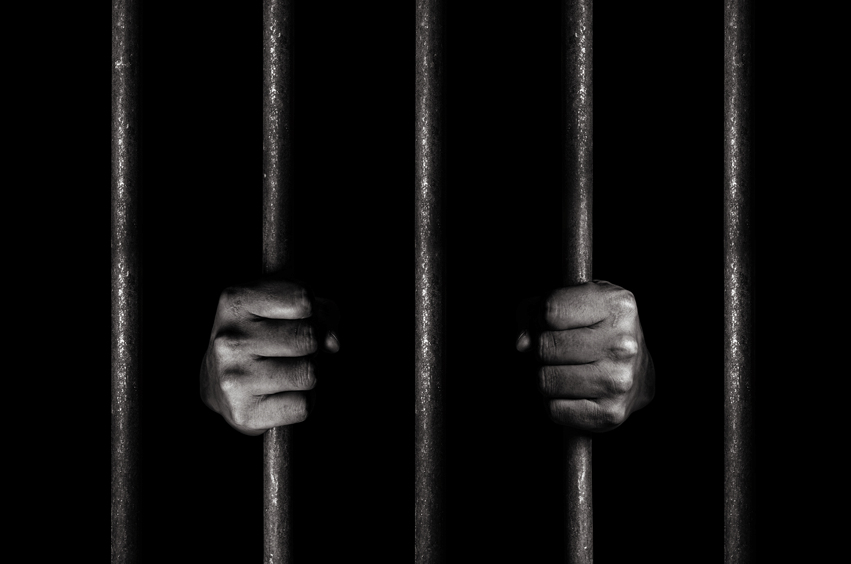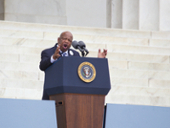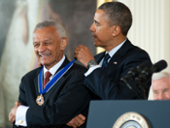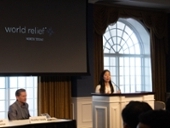My Thoughts on "Just Mercy"

Every Spring Semester, DBU’s Student Life Department hosts a movie night at a local theater for the student body. This past February, I helped plan the event. Usually, a fun and entertaining movie is selected; however, this year we took a distinct turn.
We chose the movie Just Mercy, which addresses the racial inequality found in our criminal justice system. As a black student in a predominately white institution, I was unsure of how the movie would be received and, frankly, if people would even show up. Needless to say, I was experiencing a lot of emotions leading up to the event, the predominate one being fear.
Four months ago, openly discussing race and engaging in the subject matter of injustice did not seem like it a plausible reality outside of personal conversations and designated forums. However, in the wake of the deaths of Ahmaud Arbery, Breonna Taylor, and George Floyd, the tide has shifted. People are now more willing to engage in the conversation about racism and understand that complacency is no longer the best option. The vicious cycle of racism in America has endured for far too long.
I was asked to write an article after the event to review the movie and provide my thoughts regarding racial injustice. Due to COVID-19 communications, the publish date for this article was postponed. While the article would have been helpful then, how timely and necessary it is now. Just Mercy is just one of many incredible resources available to help educate us and challenge the lens through which we view other people.
I am unsure if this is truly the turning point in this nation, but I am hopeful. I desire to see a lasting change that creates a better life for those who look like me. I pray that you seek to educate yourself on this issue and contemplate where you can bring about change in your sphere of influence.
The Movie
Bryan Stevenson’s Just Mercy, both a movie and book is heart wrenching, hopeful, emotional, and brutally honest. As an African American political science major and a DBU student event coordinator, I sat in the movie theater slightly anxious and ever so conscious of the racial tension that the movie discusses. I had never seen Just Mercy and was only at the beginning of reading the book on the night of the event. My mother warned me to prepare myself for the movie that it might bring about a sort of visceral reaction. Upon reflection, I do not think that I could have ever prepared myself for the gut-wrenching stories I saw on the screen.
The film tells of the gripping realities that Stevenson faced as a young twenty-something lawyer in Alabama, fighting for inmates, jailed for crimes they did not commit, on death row in the 1980s. Watching, I was transported to that time with those people. The racial tension was palpable from the first scene. It was a dangerous time to be a black man in the South, but Stevenson put his life on the line in pursuit of justice. I flinched at every demeaning word and hateful action. I tensed, bracing myself for every physical altercation. I wept thinking about the fact that this "movie" was Bryan Stevenson’s real life.
Early on, the audience is introduced to Walter McMillin. McMillin is accused of killing Ronda Morrison, a white woman who worked at a drying cleaning store. The facts proved his innocence, yet the flimsy and contradictory testimony of a convicted white man placed him on death row. He ultimately became one of Steveson’s clients.
His clients, a majority on death row not for their crimes but their skin color, were real people. It was sobering. He fought tirelessly. At times justice prevailed. However, in other more haunting moments, it did not, and it meant death that was both painful to watch and think through as audience members.
Those moments were painful because justice seemed like the right answer, the only answer, but inequality, oppression, and discrimination stood in its place. As the movie closed and credits rolled, updates on these real-life people appeared on the screen. In a small sense, my faith was restored, the movie ending in hopeful light with specific individuals experiencing justice. But in a broader sense, I felt a call to action. Something must be done.
The Reality
The Equal Justice Initiative writes, "The United States Sentencing Commission reported ... that black male offenders received sentences on average 19.1 percent longer than similarly situated white male offenders." This statistic is a call to consider our justice system and it’s unequal treatment of African Americans. The inequality is quite staggering and points to the reality of the blatant discrimination still present in our current criminal justice system. All of which begs the simple question, why? Why the differentiation in sentencing for the same crime?
Upon first learning about topics like mandatory minimums, mass incarceration, the War on Drugs, and privatized prison systems, I was shocked. I simply could not believe that I had lived my entire life unaware of how unfairly people were being systematically treated, especially people who looked like me. It left me in the position of feeling exposed and unprotected. I was no different than the people who I read about or saw on the news. If the system could unfairly target them for the color of their skin it could target me. I am not an exception. It pushed me to research, action, and a deeper understanding of what I could do differently.
Stevenson fought then and continues to fight now for people because he believes in their humanity, clearly stated in his belief: "you are not the worst thing that you have ever done." He thought that no human should ever be defined by their most significant shortcoming. As Christians, a biblical understanding of the Imago Dei and dignity of man should lead us to the same conclusion. We ought to see and celebrate black people for their culture, backgrounds, skin colors, and etc. We should not let personal prejudice whether conscious or subconscious cloud our ability to see the Imago Dei that is and will always be present. We should care about how our black brothers and sisters are treated in our criminal justice system. We should care and consider those who are disenfranchised. We should fight for justice and equality. There is no room for passivity or complacency.
The Response
In my bedroom, I have a wall print that says, "Seek Justice. Love Mercy. Walk Humbly." It is based on Micah 6:8, which says, "He has shown you, O mortal, what is good. And what does the Lord require of you? To act justly and to love mercy and to walk humbly with your God."
As a truth and justice-minded individual, these three short phrases have, for years, encompassed how I hope to live my life. As believers, our lives should be informed by scripture, and we should care for those different, hurting, and broken. We should pursue justice on their behalf. In these conversations, there is always something more to be done.
I have researched and come up with several efforts that I believe help move this conversation and issue forward.
- Educate yourself on mass incarceration and how the criminal justice system unequally impacts the African African community.
- Engage and have conversations about social justice.
- Reach out to your legislators and let them know that you want to see responsible criminal justice policies and reform.
- Give financially to non-profits, that fight for criminal justice reform.
- Watch documentaries like 13th on Netflix and read books like The New Jim Crow that explain mass incarceration.
I leave you with a quote from Bryan Stevenson: "The true measure of our character is how we treat the poor, the disfavored, the accused, the incarcerated and the condemned."
Sidney Carter is a DBU senior studying Political Science with a double minor in Communications and Legal Studies.






